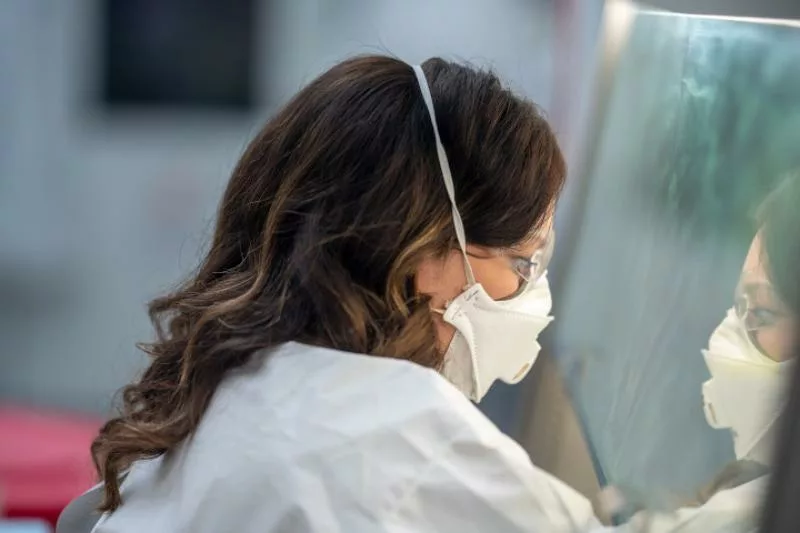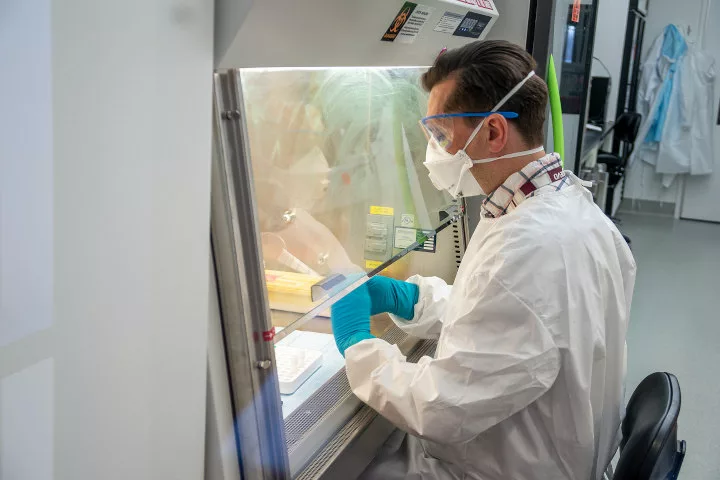Technology, Entrepreneurs Changing Healthcare Student Interest Group Aims To Spur Early Collaboration
The student group is looking to provide medical students with firsthand opportunities to experience the medical innovation process.
As the 2019 novel coronavirus (COVID-19) spreads across the globe, scientists at the Wisconsin State Laboratory of Hygiene at the University of Wisconsin–Madison respond in the tradition set by their predecessors from the lab’s founding in 1903 — providing accurate testing for Wisconsin physicians to protect the health of the state’s residents.
The State Lab of Hygiene was the first public health laboratory in the United States to be placed in a university rather than a state health department. The intent was to take advantage of the expertise of UW–Madison faculty, primarily in infectious diseases, to serve the needs of the then State Board of Health. In the 117 years since, the State Lab’s role has expanded far beyond that — now also including newborn screening, genetics, cytology, and environmental and occupational health — for Wisconsin, as well as the nation and world. However, the laboratory’s core mission to “improve and protect the human condition by providing accurate and precise testing, service, research and education” remains the same.
“The State Laboratory of Hygiene exemplifies the Wisconsin Idea from our beginnings to the present day,” says State Lab of Hygiene Director and UW Civil and Environmental Engineering Professor James Schauer, PhD, MBA, PE. “We are the only state public-health lab that is truly integrated into a university, and that makes us unique.”

The State Lab of Hygiene is a key partner with the UW School of Medicine and Public Health. Past directors of the State Lab have served as chair of the Department of Preventive Medicine (now the Department of Population Health Sciences) and the Department of Pathology and Laboratory Medicine. Today, State Lab scientists hold Center for Health Sciences (CHS) and adjunct faculty appointments in the Departments of Pediatrics, Pathology and Laboratory Medicine, and Medical Microbiology and Immunology.
“While the relationship between the State Lab of Hygiene and the medical school has a long history, the increased commitment of the School of Medicine and Public Health to public health in the 21st century is leading to even stronger collaborations focused on public-health issues, as well as synergies in the development of shared infrastructure and databases necessary for public-health research,” notes Richard Moss, PhD, senior associate dean for basic research, biotechnology and graduate studies, and the UW–Madison chancellor’s representative on the State Lab of Hygiene Board of Directors.
The State Lab of Hygiene plays a vital role as the state’s lead laboratory partner, working in concert with the Centers for Disease Control and Prevention (CDC) in Atlanta and the Wisconsin Department of Health Services to rapidly address various threats.
As the state’s primary emergency-response laboratory, the State Lab of Hygiene receives CDC funding to perform cutting-edge molecular testing to rapidly and accurately diagnose biological public-health threats, including COVID-19, Zika, Ebola and pandemic influenza viruses. In cases of novel pathogens, the lab performs initial testing with CDC-developed methods, and it works with clinical laboratories around the state to help them develop diagnostic capabilities as commercial test methods become available.
“The State Lab of Hygiene is a linchpin in both state and national laboratory response networks,” says Peter Shult, PhD ’84, director, State Lab of Hygiene Communicable Disease Division and Emergency Response. “We help link the CDC with the 130+ hospital-based clinical labs around the state in order to face emerging infections, as well as more localized outbreaks. Only by working together at the national, state and local level can we meet all these threats.”

The State Lab of Hygiene also is a Level 1 chemical emergency-response laboratory serving as a surge capacity laboratory for the CDC. The State Lab’s Chemical Emergency Response Unit was the first lab in the United States to provide quantitative diagnostic testing in 2018 as part of the multi-state brodifacoumlaced synthetic cannabinoid outbreak, and it has been actively involved in the 2019-2020 vaping investigation. In addition, the State Lab Forensic Toxicology Unit is receiving CDC funding and is actively involved with the Wisconsin Department of Health Services on opioid-use surveillance.
During emergencies and normal times, State Lab of Hygiene scientists also are:
“The State Lab of Hygiene is a leading innovator among public-health laboratories in the development and validation of novel diagnostic assays, in newborn screening, and in collaborations with the UW Center for Human Genomics and Precision Medicine in genomic applications in medicine,” explains Moss. “The collaboration between the State Lab and the School of Medicine and Public Health is advancing clinical care. For example, newborn screening for spinal muscular atrophy, an initiative led by Dr. Mei Baker — who is jointly appointed in the laboratory and the Department of Pediatrics — identified a newborn with the disease. Early detection resulted in the application of a new gene-based therapy that is most effective before symptoms of the disease are evident.”
Jonathan Temte, MD ’87, PhD, a professor in the Department of Family Medicine and Community Health, and the school’s associate dean for public health and community engagement, has had a long working relationship with the State Lab of Hygiene through his research about immunization practices and viral-disease surveillance in primary care. “I have been blessed to work with many mentors, partners and close colleagues within the Communicable Disease Division over the past 25 years. In my work with the CDC, I have been constantly reminded of the high regard people in that agency and other similar organizations hold for the State Lab of Hygiene, across the nation and around the globe,” says Temte.
Reflecting on the State Lab of Hygiene’s role in the state and beyond Wisconsin’s borders, Schauer notes, “Through our wide-ranging activities, the State Lab is touching the lives of most Wisconsinites in some way every day. We are proud of our past and even more excited for our future opportunities and collaborations.”